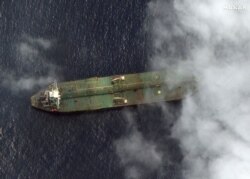This article originated in VOA’s Persian Service.
The United States has confirmed Britain’s accusation that Iran delivered oil from a U.S.-sanctioned tanker to Syria in defiance of U.S. and EU sanctions that bar Tehran from making such deliveries.
Speaking to reporters at Thursday’s State Department press briefing, spokeswoman Morgan Ortagus said Iran “delivered oil to Syria and that fuel goes straight into the tanks of troops that are slaughtering innocent Syrians.”
Asked by a reporter if the U.S. has evidence that the “delivered oil” came from the U.S.-sanctioned tanker Adrian Darya 1, which has been anchored near the Syrian coast for more than a week, Ortagus replied: “I wouldn’t say that if we didn’t.”
In a tweet posted Wednesday, Iranian Ambassador to Britain Hamid Baeidinejad said the Iranian-owned tanker had sold its oil at sea to an unnamed private company “despite numerous American threats.”
U.S. ally Britain had seized the tanker July 4 under its former name of Grace 1 in the waters of the British territory of Gibraltar, on suspicion it planned to deliver Iranian oil to Syria in violation of EU sanctions on the Syrian government of President Bashar al-Assad. Gibraltar allowed the tanker, under its new name of Adrian Darya 1, to leave its waters Aug. 18 after saying British authorities had received written assurances that Iran would not deliver the oil to Syria.
Iranian officials denied providing such assurances and the Adrian Darya 1 sailed toward the Syrian coast before turning off its transponder Sept. 2. The Trump administration, which unilaterally banned all Iranian oil exports in May to pressure Tehran to stop perceived malign behaviors, appealed unsuccessfully to Britain not to release the tanker and later sanctioned the vessel Aug. 30.
In his tweet, Baeidinejad said Iran believes EU sanctions “cannot be extended to third countries.” He posted his comments after being summoned a day earlier by British Foreign Minister Dominic Raab, who issued a statement condemning Iran for “breaching assurances” about the tanker. Raab said it was “clear … that the oil has been transferred to Syria and Assad’s murderous regime.”
Ortagus, in her Thursday remarks, said it is important for the international community to note that “once again you have been lied to and misled by the Iranian regime.”
In a Wednesday report, Iranian state news agency IRNA also quoted Iranian Ambassador Baeidinejad as saying the new private owner of the tanker’s 2.1 million barrels of oil will choose the destination of the crude, without elaborating.
Earlier, Iran’s semi-official Mehr News Agency had quoted foreign ministry spokesman Abbas Mousavi as telling state media Sunday that the tanker had “docked on the Mediterranean coast and unloaded its cargo,” without specifying the date or other details.
TankerTrackers.com, one of the few companies monitoring global oil shipments, disputed that contention, tweeting that satellite imagery showed the Adrian Darya 1 remained anchored off the Syrian port of Tartous Wednesday with all of its oil still on board.
Samir Madani, co-founder of TankerTrackers.com, dismissed the significance of Iran’s assertion that it has sold the oil to a private company.
“The reported monetary transaction has no relevance because a buyer has not shown up and won’t do so, as the whole world is watching this now,” Madani told VOA Persian. “It’s all talk until the oil actually has been discharged from that vessel,” he added.
U.S. officials repeatedly have warned the international shipping industry that Washington will aggressively enforce U.S. secondary sanctions against anyone doing business with sanctioned Iranian parties and cargo.
Reid I’Anson, a Houston-based global energy economist for French intelligence company Kpler, said he believed Iran has offloaded at least some of the oil from Adrian Darya 1.
“We assume the tanker discharged oil after it went dark (by turning off its transponder) because a ship costs money to keep floating and it’s not going to sit there for a week and do nothing,” I’Anson said in a Wednesday interview with VOA Persian. “It could have transferred oil at a port or done a partial ship-to-ship (STS) transfer anytime after Sept. 2 with a component vessel that also could have turned off its transponder.”
I’Anson also said the Iranian tanker may have transferred oil to vessels bound for Turkey or Syria, with both nations having been Iran’s only major oil customers in the region.
In the days before turning off its transponder, the Adrian Darya 1 had identified the Turkish ports of Mersin and Iskenderun as its possible destinations, according to data compiled by ship tracking and maritime intelligence company MarineTraffic.
Madani said he doubted Turkey would have sent a tanker to transfer oil from the Iranian tanker.
“Turkey’s refineries are petrified of touching Iranian oil. They deal in U.S. dollars,” he said.
The U.S. State Department did not immediately respond to a VOA Persian request for comment on Iran’s assertion that it has sold the tanker’s oil to a private company.













